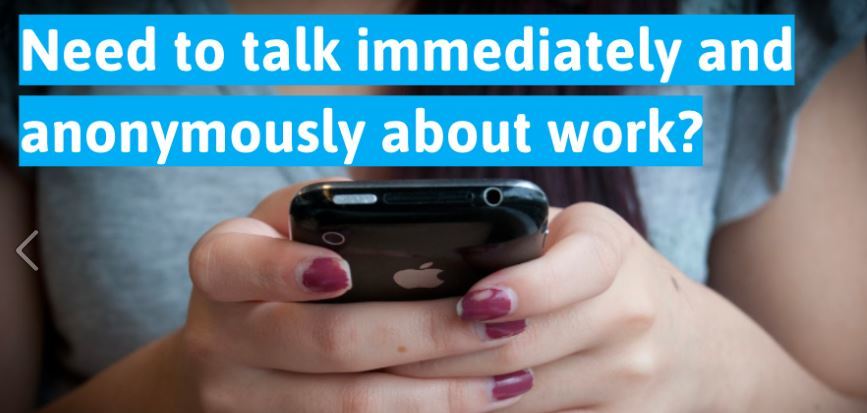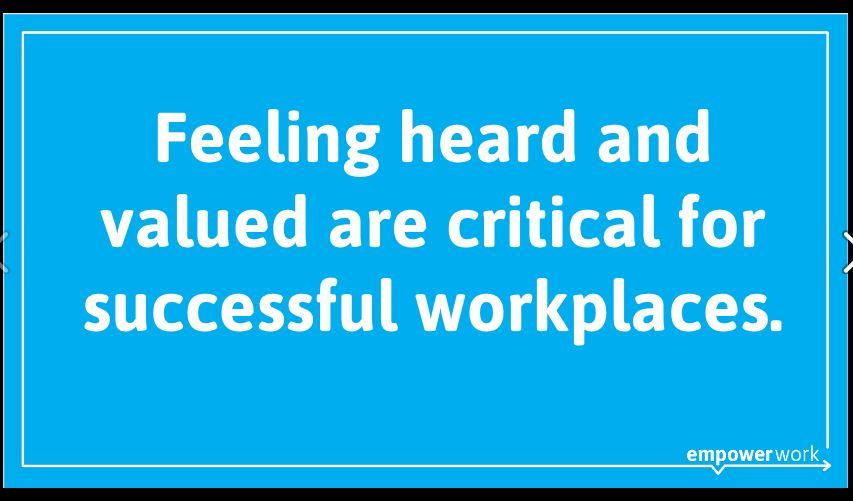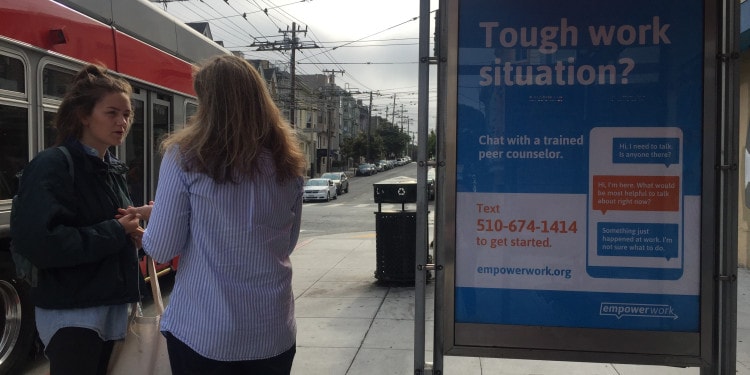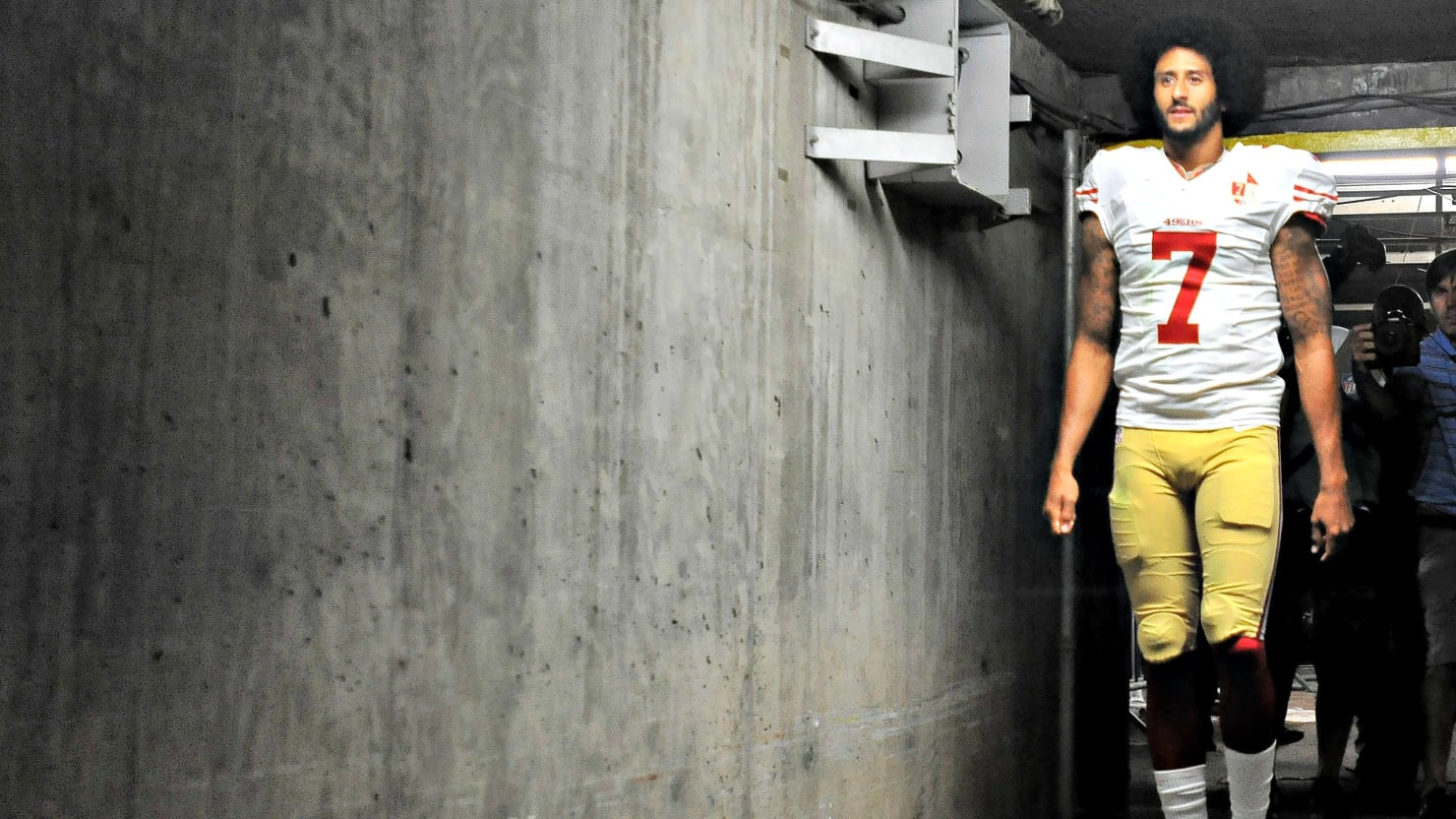Difficulties in the workplace have been around for as long as we can remember. From a lack of motivation to harassment to ethical conflicts, the number of potential challenges at work is countless. Unfortunately, the tools available to navigate these tough situations are severely lacking. If you work at a well-established company or are well-situated, you might have access to internal coaching within your company, or you might be able to connect with a lawyer as part of your personal network. But for most Americans, this is not the case. Empower Work is a way for anyone facing an unfamiliar workplace situation to get free and accessible support quickly.
Empower Work is a non-profit that provides workers with an accessible and anonymous text line for all work-related issues. With just a few taps, people can immediately connect with trained peer counselors via text or web chat. Empower Work offers considerations and useful information that can help clarify an assortment of workplace problems. They help figure out what is most important to you and disclose all options so you can take the best decisions.
To learn more about Empower Work, the work they do, and their goals, I sat down with founder and executive director Jaime-Alexis Fowler.
 In the Photo: Empower Work Founder/Executive Director, Jaime Alexis-Fowler. Photo Credit: Empower Work
In the Photo: Empower Work Founder/Executive Director, Jaime Alexis-Fowler. Photo Credit: Empower Work
How was the idea for Empower Work conceived?
Jaime Alexis-Fowler: It started last year with the question of how we could better support people facing work-related challenges. The idea came out of a conversation that I had with an individual who had come to me through my larger network. She was struggling with student loans and working in a place that didn’t have a lot of resources. She couldn’t access anything within her company and she also didn’t have the personal means to seek out other areas of support.
Leaving that conversation, I wondered why there wasn’t another service I could refer her to. That started me on a quest of finding out what services exist to help address this issue and how effective they were. In the course of my career as a manager, and on the executive leadership at a range of organizations, I have always been focused on how to support individuals on my team and that’s been really important to me in every company where I’ve worked. But thinking about this question last year, I was surprised to find this gap for workplace support.
From there, Empower Work was born, and we launched the pilot last summer. The thought of affecting not just people I worked with but also a much broader scale intrigued me. I am a pragmatic person so I started with what was the need and how do you listen and respond to the folks who are facing that need. From there, it was all about coming up with an approach that really meets people where they are.
What made you realize that this was a big problem?
JAF: In our research, we saw that for people who didn’t have that support and faced something challenging, half left their job as a result. For many, leaving their job resulted in an even more negative outcome. Leaving a job without a next job lined up or taking a pay cut can affect a person’s career and emotional well-being. When you think about particular groups who are less represented or less supported in workplaces, the effects were even more dramatic.
Coming up with a resource or thinking about a way that could shift the trajectory for someone who is facing that challenge, whether it’s ethical questions, harassment or discrimination for example, is crucial. Stress at work is among one of the highest leading causes of other health concerns for the US workforce. There are these cumulative detrimental effects of feeling unsupported and not being able to navigate something that’s going on, whether that’s health or financial well-being across a full spectrum.
 In the Photo: Empower Work Text Graphic. Photo Credit: Empower Work
In the Photo: Empower Work Text Graphic. Photo Credit: Empower Work
How do you know what kind of support to offer different types of employees?
JAF: We are about creating space for the person to grapple with what they are facing. Our model is based on best practices and coaching and counseling with a basis in human resources. What we find is that the things people are facing are not specific to industries. If you are facing microaggressions or work anxiety, that’s not specific to your industry or job, these are just things that happen in workplaces.
What we’re really focused on in our approach is helping the person think through what they know of themselves and the situation. It’s deeply personal and contextual. For instance, one person getting a surprise performance improvement plan at one company may need something very different than another person due to what’s important to them, what the situation is, and how they feel comfortable approaching it.
We create the space to talk through the situation with the individual so they come to an understanding of what’s most important for them. Then, together, we think through what the game plan should be to address the situation with that goal in mind. We don’t tell people you should absolutely do a certain thing because that’s really disempowering. What’s empowering for someone is to go from feeling backed into a corner to having multiple options. Our goal is to help you leave a conversation feeling like you not only have multiple options but you’ve chosen something that works for you. Whatever that action is, it’s totally determined by the individual.
What challenges have you encountered so far?
JAF: I would say we have been wonderfully fortunate as an organization. Over the past year, we have had more than three-hundred people trying to help get this off the ground. Whether that’s some of our fantastic advisors, board members, or volunteers, we are very lucky to have all these people committed to our mission. We are at a turning point in the US and people recognize that where we are right now in terms of what’s happening at workplaces isn’t sustainable. Trying to harness that energy and effectively respond to it, that’s been one of the biggest challenges for Empower Work.
On the fundraising side, there is tension because we are this anonymous support and we have demographic information about people who share it. We have funders who say I can only give to organizations that are meeting certain requirements, and that’s something we are trying to figure out. How do we stay true to our goal of remaining confidential and anonymous while also being able to demonstrate to funders the the impact of our support? That can be a difficult thing to capture from the funding perspective, but we definitely see there being a huge need for that.

In the Photo: An ad. part of the Empower Work campaign. Photo Credit: Empower Work
How does someone learn to become a counselor?
JAF: We have an application process, and we screen and vet all of our volunteers. We also go through references and other things, and after folks go through that process, they go into live training over video. Right now we have a four week training program, lasting for about thirty hours. The training includes a lot of different aspects of curriculum that help you learn how to ask questions that are opening and create trust and space for somebody. We also include aspects of bias training and information about legal rights at work.
Part of the value for the volunteers is that there is a community for the volunteers. We really value feedback and we talk through conversations and find out what works and what doesn’t. Feedback is really important; we give feedback to volunteers and volunteers give feedback on our model. We find that volunteers often stay afterwards after the training and after they have been on the line, they just come into work differently.
One of our volunteers who is a longtime HR professional did an entirely different new training for her entire organization based on something she learned with Empower Work. She now coaches people in her company differently based on what she has seen. We also see that people who volunteer even if they are really seasoned learn new things that helps them professionally.

In the Photo: The idea behind Empower Work. Photo Credit: Empower Work
Where does Empower Work go from here?
JAF: We’re on a mission to make sure that there are healthy workplaces everywhere and that employees are valued, supported and empowered. I think we are at this unique inflection point and it will take lots of different approaches, lots of different collaborations, lots of different organizations, and new ways of thinking really coming at this. That’s what we see as a pathway forward, a wonderful collaboration of entities working together.
We also want to think about how we use the data that is coming out from Empower Work about what people are facing to think about new policies and approaches. We plan on making our data an aggregate and fully anonymized and available. It would help identify larger work trends and show how we can change workplaces. There’s really not a good place for real-time workplace data right now and we hope that we’ll be able to provide an aspect of that to drive different conversations in the future.
We’re working with some research partners to look at our training model and our approach and how they positively shift the ability for people to have these conversations, and how that could inform workplaces, management training, and things like that. There are a lot of different ways in which we are going to continue to learn and grow, and hopefully that also means more and more people. Above all, we want to be there for those who feel like they don’t have any other place to go.









